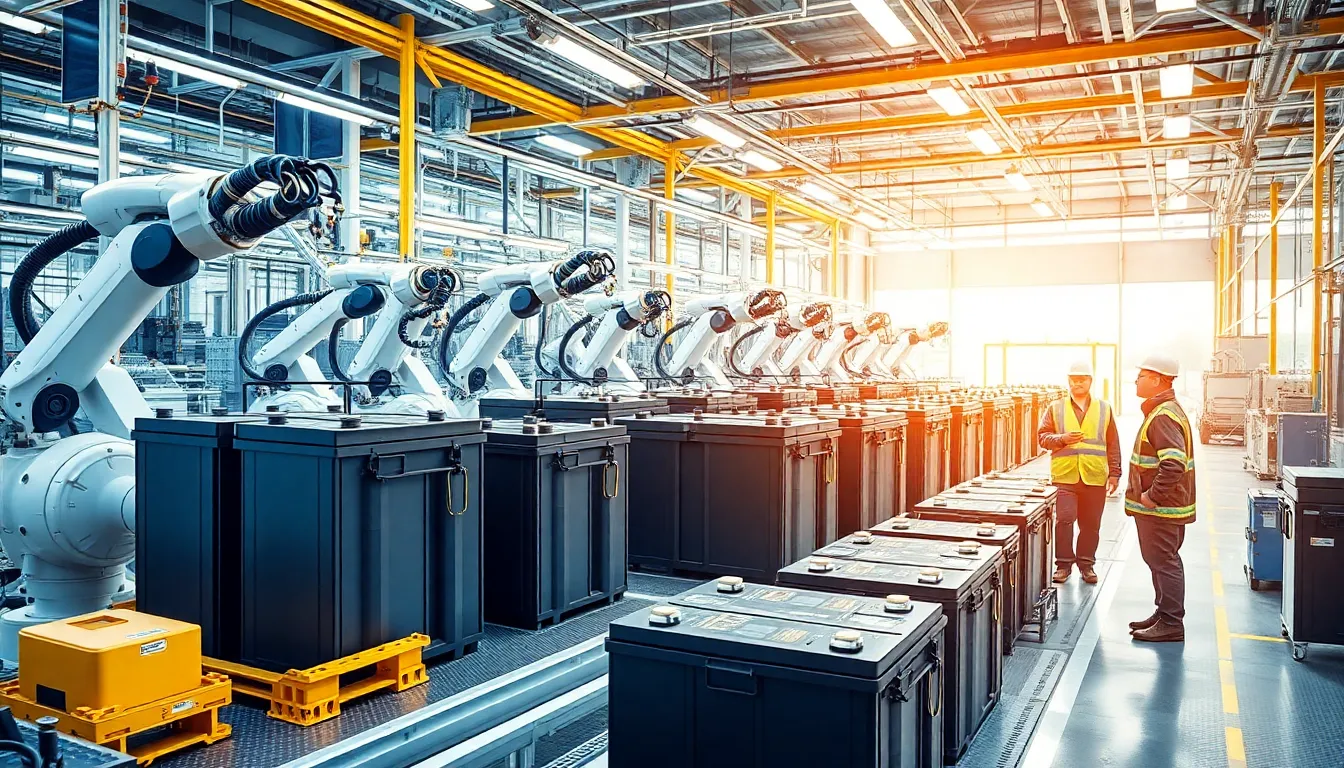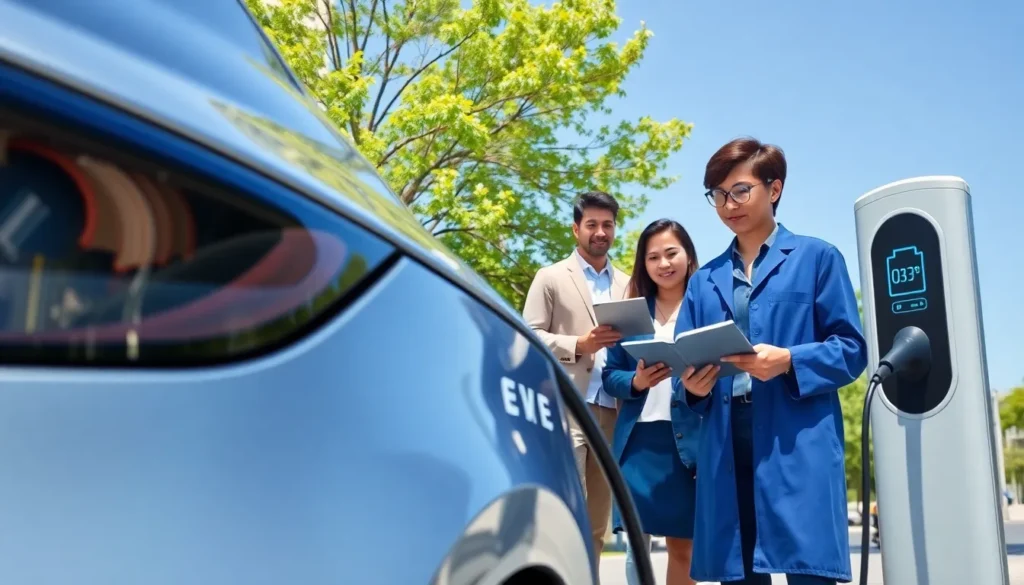Table of Contents
ToggleElectric vehicles are zooming into the future, and at the heart of this revolution lies one critical component: the battery. As technology evolves faster than a toddler on a sugar rush, staying updated on the latest in EV battery developments is essential for anyone who wants to keep their finger on the pulse of the automotive world.
Recent Developments in EV Battery Technology
Recent advancements in electric vehicle (EV) battery technology showcase significant progress in efficiency and sustainability. Innovations continue to reshape the landscape of battery performance, influencing the future of automotive mobility.
Breakthrough Innovations
Lithium-silicon batteries offer enhanced energy density compared to traditional lithium-ion models, providing more range for EVs. Solid-state batteries, a revolutionary technology, promise increased safety and longer lifespan by using solid electrolytes. Furthermore, recycling processes for lithium-ion batteries have improved, which contributes to sustainability and reduces resource extraction. Researchers have also made strides in fast-charging capabilities, enabling EVs to charge within minutes rather than hours. Each innovation contributes toward establishing a more efficient future for electric transportation.
Major Collaborations and Partnerships
Tesla’s collaboration with Panasonic continues to yield advancements in battery production and efficiency. Partnerships between major automakers and battery manufacturers, like Ford and SK Innovation, focus on developing next-generation battery technologies. GM’s partnership with LG Energy Solution aims to create affordable, high-performance battery cells using innovative manufacturing techniques. Companies such as BMW work with solid-state battery developers to expedite the transition to safer battery systems. These collaborations play a crucial role in accelerating the deployment of electric vehicles on the roads.
Key Players in the EV Battery Landscape

The electric vehicle battery market features both established manufacturers and innovative startups. These players contribute significantly to the transformation of battery technology.
Leading Manufacturers
Leading manufacturers dominate the electric vehicle battery sector with substantial investments and technological advancements. Tesla partners with Panasonic to produce high-performance lithium-ion batteries, enhancing efficiency and charging speeds. LG Energy Solution collaborates with GM to develop batteries for a range of electric models, focusing on safety and energy density. Samsung SDI focuses on research and development to improve battery longevity and sustainability. CATL, based in China, holds a significant market share, providing batteries to various automakers worldwide. Each of these companies plays a crucial role in advancing the EV battery landscape, driving competition and innovation.
Emerging Startups
Emerging startups bring fresh ideas and novel technologies to the EV battery arena. QuantumScape specializes in solid-state batteries, aiming for higher energy densities and increased safety. Northvolt focuses on sustainable lithium-ion battery production, emphasizing recycling and eco-friendly materials. StoreDot develops fast-charging battery technology, targeting a full charge in under 30 minutes. Sila Nanotechnologies innovates with silicon-based anodes, promising enhanced battery capacity. These startups complement established players by accelerating advancements and paving the way for the next generation of EV batteries.
Environmental Impact of EV Batteries
Electric vehicle (EV) batteries significantly influence environmental sustainability. These impacts occur during the life cycle of battery production, use, and disposal.
Sustainable Sourcing of Materials
Sourcing materials for EV batteries directly affects their sustainability. Lithium, cobalt, and nickel, essential for battery production, often come from environmentally sensitive regions. Companies increasingly focus on ethical mining practices to minimize this impact. Innovations in alternative materials, such as lithium iron phosphate (LFP), enhance sustainability by reducing reliance on scarce resources. Firms explore securing responsible supply chains, ensuring minimal environmental degradation. New technologies aim to increase recycling efficiency and materials recovery, further addressing resource depletion.
Recycling and Waste Management
Effective recycling processes play a vital role in managing battery waste. Recycling EV batteries helps recover valuable materials, reducing the need for raw material extraction. Advances in recycling technologies lead to higher recovery rates, fostering a circular economy. Policies promoting battery take-back programs support responsible disposal and recycling initiatives. Collaboration among manufacturers, recyclers, and policymakers enhances overall waste management efforts. As recycling infrastructure evolves, it becomes easier to redirect waste back into production cycles, ultimately decreasing environmental footprints.
Future Trends in EV Battery Technology
Recent advancements promise substantial growth in EV battery technology, focusing on efficiency, safety, and sustainability.
Solid-State Batteries
Solid-state batteries represent a significant shift in battery design. These batteries utilize solid electrolytes instead of liquid ones, enhancing safety by reducing flammability risks. Energy density improves, allowing for longer ranges on electric vehicles. Companies like QuantumScape lead the way in developing this technology, with claims of doubling the energy capacity compared to conventional lithium-ion batteries. Additionally, solid-state batteries typically exhibit longer lifespans, making them an attractive option for manufacturers aiming to reduce replacement frequency. As production processes scale, the transition to solid-state technology may accelerate, providing a future where EVs can operate more efficiently and reliably.
Fast-Charging Solutions
Fast-charging technology is evolving rapidly, crucial for enhancing consumer convenience. Charging stations utilizing high-power chargers can recharge EV batteries significantly faster than standard options. Companies like Tesla already implement ultra-fast charging networks, reducing wait times for users. New advancements aim for charging rates exceeding 300 kW, allowing drivers to gain substantial range in just a few minutes. Additionally, innovative battery chemistries are emerging to support these fast-charging capabilities, minimizing battery degradation during rapid charging cycles. As infrastructure expands, fast-charging solutions will play a pivotal role in making electric vehicles more accessible.
The landscape of EV battery technology is evolving at an unprecedented pace. Innovations like solid-state batteries and advanced recycling methods are set to redefine the future of electric vehicles. As industry leaders and startups collaborate to push boundaries, the focus on sustainability and efficiency becomes ever more critical.
Staying informed about these developments is essential for anyone involved in the automotive sector. With the right advancements and partnerships in place, a cleaner and more efficient electric transportation future is on the horizon. The commitment to ethical practices and innovative solutions will pave the way for a more sustainable world.




